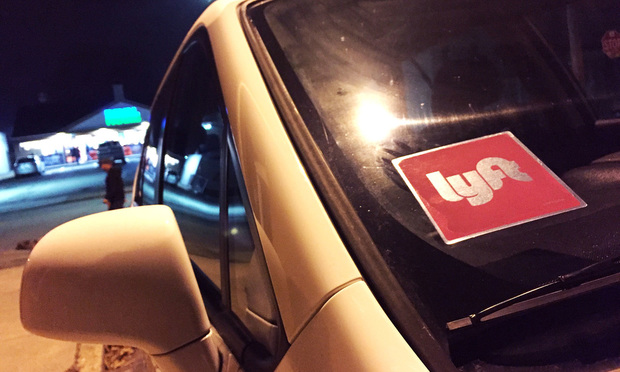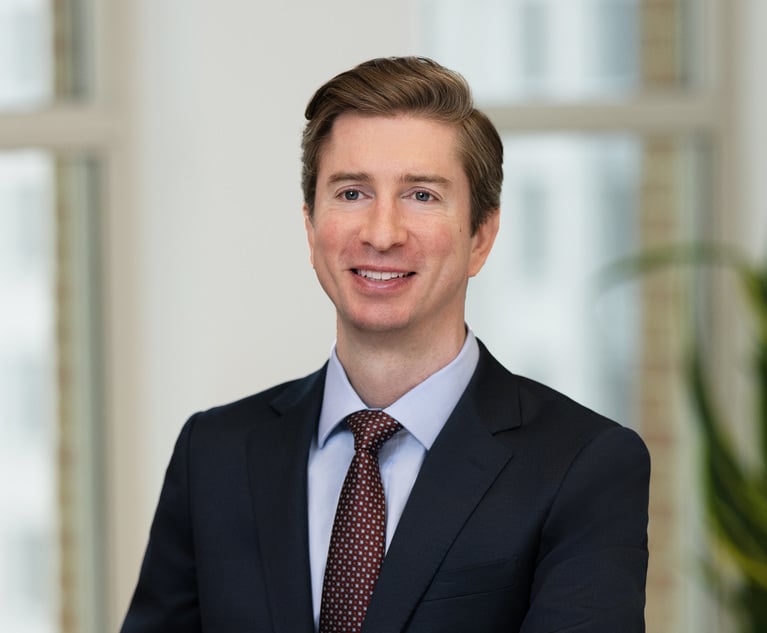Lyft Tries to Hail $569,000 Fee Award in Patent Case
The ride-hailing company says that an inventor who was seeking $584 million in damages should have known the game was up once the Patent Trial and Appeal Board found his patent claims indefinite.
December 04, 2019 at 03:27 PM
4 minute read
 Photo: Diego M. Radzinschi/ALM
Photo: Diego M. Radzinschi/ALM
The way Lyft Inc. sees it, a retired professor who claims to have patented the wireless ride-sharing platform should have quit when he was behind.
Lyft wants U.S. District Judge Jon Tigar of the Northern District of California to force RideApp Inc., a company founded by Georgia Tech professor emeritus Stephen Dickerson, to pay more than $500,000 in attorney fees that Lyft incurred after the U.S. Patent and Trademark Office indicated last July that RideApp's patent claims are indefinite.
RideApp instead pushed ahead with its district court case—seeking $584 million in damages, according to Lyft. When Tigar construed the claims of Dickerson's 6,697,730 patent in October, he found that they are indeed invalid for indefiniteness.
"When the Patent Office confirmed the invalidity of the '730 Patent, not once, but twice, RideApp was fully aware its patent was invalid," Baker Botts partner Jeremy Taylor writes in a motion Lyft filed Monday in RideApp v. Lyft. "Despite this, RideApp refused to dismiss the case and offered no explanation of how RideApp could continue to plausibly assert the '730 Patent in light of the Patent Office's invalidity findings."
Lyft is asking Tigar to declare the case exceptional and award $569,254 in fees under Section 285 of the Patent Act.
Lisa Philips of Fisch Sigler, who's not involved in the case, said the move last year to bring the PTAB's claim construction standard in line with the federal court standard poses risks for both sides. So far the cases have focused on patentees, but "we're likely to soon see 285 motions against losing defendants arguing that they've taken inconsistent claim construction positions," she said.
Patentees in RideApp's situation "may also try to rely on a separation of powers argument that they're entitled to be heard on claim construction in their chosen forum," she added. "It remains to be seen how courts will address that argument."
RideApp sued Lyft last year in New York federal court. Kasowitz Torres Benson partner Marc Kasowitz alleged in the complaint that Lyft has "egregiously infringed the '730 patent without paying any compensation to Prof. Dickerson, despite earning up to $1 billion in annual revenue." RideApp and Kilpatrick Townsend & Stockton filed a similar suit against Uber Technologies Inc. in Georgia federal court earlier this year.
Lyft got the New York case transferred to San Francisco. Both Lyft and Unified Patents then asked the USPTO's Patent Trial and Appeal Board (PTAB) to review the validity of Dickerson's patent. The PTAB issued orders in July and August declining, each time stating that the '730 describes a wireless means for allocating passengers to vehicles, but without disclosing the algorithms that would make the system work.
Because the claims are indefinite, the PTAB concluded it could not determine whether they're anticipated by or obvious in view of prior art. (The America Invents Act does not empower the PTAB, as part of the inter partes review process, to formally declare patents invalid for indefiniteness.)
Tigar ruled in October that while he's not bound by the PTAB's constructions of the claims, he agreed with them. "In this case, the '730 patent contains no algorithm whatsoever—simple or otherwise—describing how the invention performs the tracking function," he wrote.
He also dinged RideApp for belatedly changing its proposed claim construction, saying its conduct is "not conducive to the orderly progress of this case."
RideApp is appealing Tigar's claim construction to the U.S. Court of Appeals for the Federal Circuit. The company argued to Tigar that figures and tables in the patent's specification provide "extensive disclosure" of the ride allocation system. "The PTAB itself does not consider these decisions binding, and the court should give it little weight," RideApp argued in a brief signed by Kasowitz partner Jeffrey Toney.
Toney did not respond Wednesday morning to an email seeking comment.
According to Lyft's fee motion, RideApp had estimated damages in the case at $584 million through 2018, plus interest and on ongoing 4% royalty.
The motion lists Baker Botts partner Taylor's standard billing rate as $970 an hour. Senior associates Elizabeth Boggs and John Gaustad bill at $900 an hour. Associate Keith Jurek's rate is $670. After discounts and other fee reductions, Lyft says the rates actually billed ranged from $500 to $670 per hour for associates and $826 per hour for Taylor.
This content has been archived. It is available through our partners, LexisNexis® and Bloomberg Law.
To view this content, please continue to their sites.
Not a Lexis Subscriber?
Subscribe Now
Not a Bloomberg Law Subscriber?
Subscribe Now
NOT FOR REPRINT
© 2025 ALM Global, LLC, All Rights Reserved. Request academic re-use from www.copyright.com. All other uses, submit a request to [email protected]. For more information visit Asset & Logo Licensing.
You Might Like
View All
Meta agrees to pay $25 million to settle lawsuit from Trump after Jan. 6 suspension
4 minute read
How We Won It: Latham Secures Back-to-Back ITC Patent Wins for California Companies
6 minute read

Law Firms Mentioned
Trending Stories
- 1Delaware Supreme Court Names Civil Litigator to Serve as New Chief Disciplinary Counsel
- 2Inside Track: Why Relentless Self-Promoters Need Not Apply for GC Posts
- 3Fresh lawsuit hits Oregon city at the heart of Supreme Court ruling on homeless encampments
- 4Ex-Kline & Specter Associate Drops Lawsuit Against the Firm
- 5Am Law 100 Lateral Partner Hiring Rose in 2024: Report
Who Got The Work
J. Brugh Lower of Gibbons has entered an appearance for industrial equipment supplier Devco Corporation in a pending trademark infringement lawsuit. The suit, accusing the defendant of selling knock-off Graco products, was filed Dec. 18 in New Jersey District Court by Rivkin Radler on behalf of Graco Inc. and Graco Minnesota. The case, assigned to U.S. District Judge Zahid N. Quraishi, is 3:24-cv-11294, Graco Inc. et al v. Devco Corporation.
Who Got The Work
Rebecca Maller-Stein and Kent A. Yalowitz of Arnold & Porter Kaye Scholer have entered their appearances for Hanaco Venture Capital and its executives, Lior Prosor and David Frankel, in a pending securities lawsuit. The action, filed on Dec. 24 in New York Southern District Court by Zell, Aron & Co. on behalf of Goldeneye Advisors, accuses the defendants of negligently and fraudulently managing the plaintiff's $1 million investment. The case, assigned to U.S. District Judge Vernon S. Broderick, is 1:24-cv-09918, Goldeneye Advisors, LLC v. Hanaco Venture Capital, Ltd. et al.
Who Got The Work
Attorneys from A&O Shearman has stepped in as defense counsel for Toronto-Dominion Bank and other defendants in a pending securities class action. The suit, filed Dec. 11 in New York Southern District Court by Bleichmar Fonti & Auld, accuses the defendants of concealing the bank's 'pervasive' deficiencies in regards to its compliance with the Bank Secrecy Act and the quality of its anti-money laundering controls. The case, assigned to U.S. District Judge Arun Subramanian, is 1:24-cv-09445, Gonzalez v. The Toronto-Dominion Bank et al.
Who Got The Work
Crown Castle International, a Pennsylvania company providing shared communications infrastructure, has turned to Luke D. Wolf of Gordon Rees Scully Mansukhani to fend off a pending breach-of-contract lawsuit. The court action, filed Nov. 25 in Michigan Eastern District Court by Hooper Hathaway PC on behalf of The Town Residences LLC, accuses Crown Castle of failing to transfer approximately $30,000 in utility payments from T-Mobile in breach of a roof-top lease and assignment agreement. The case, assigned to U.S. District Judge Susan K. Declercq, is 2:24-cv-13131, The Town Residences LLC v. T-Mobile US, Inc. et al.
Who Got The Work
Wilfred P. Coronato and Daniel M. Schwartz of McCarter & English have stepped in as defense counsel to Electrolux Home Products Inc. in a pending product liability lawsuit. The court action, filed Nov. 26 in New York Eastern District Court by Poulos Lopiccolo PC and Nagel Rice LLP on behalf of David Stern, alleges that the defendant's refrigerators’ drawers and shelving repeatedly break and fall apart within months after purchase. The case, assigned to U.S. District Judge Joan M. Azrack, is 2:24-cv-08204, Stern v. Electrolux Home Products, Inc.
Featured Firms
Law Offices of Gary Martin Hays & Associates, P.C.
(470) 294-1674
Law Offices of Mark E. Salomone
(857) 444-6468
Smith & Hassler
(713) 739-1250






